2022年中考语法复习—非谓语动词课件(共25张PPT)
文档属性
| 名称 | 2022年中考语法复习—非谓语动词课件(共25张PPT) | 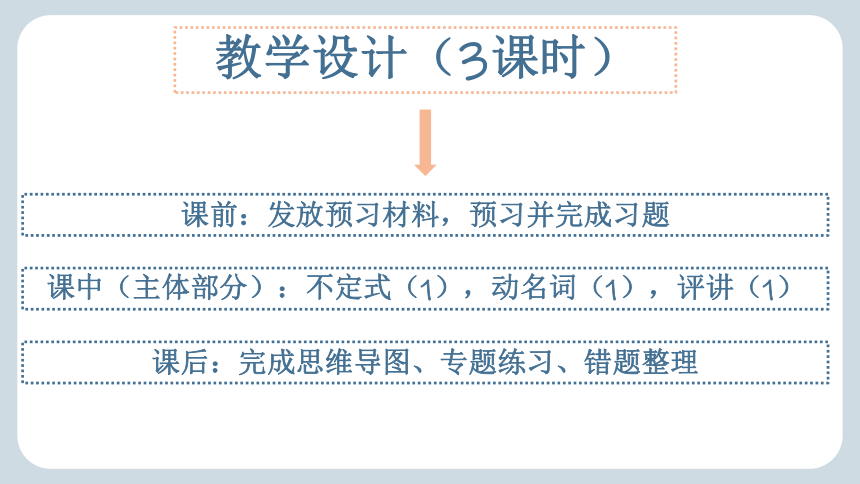 | |
| 格式 | pptx | ||
| 文件大小 | 1.7MB | ||
| 资源类型 | 教案 | ||
| 版本资源 | 通用版 | ||
| 科目 | 英语 | ||
| 更新时间 | 2022-05-03 21:27:36 | ||
图片预览


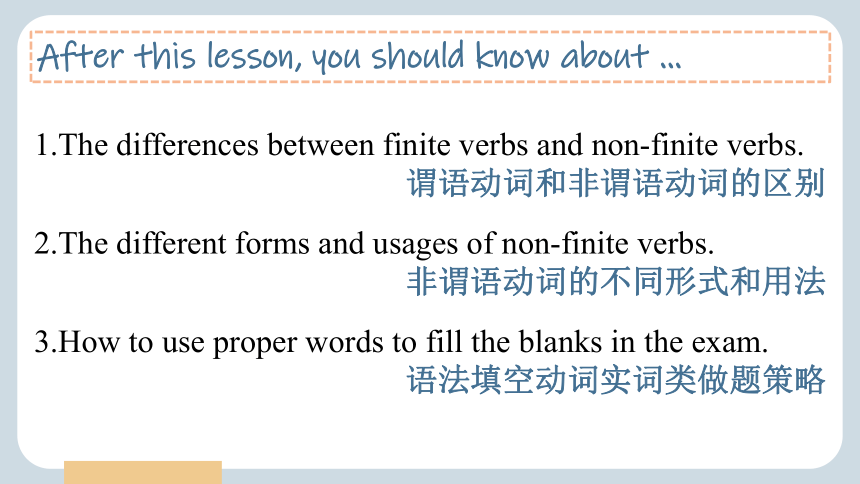
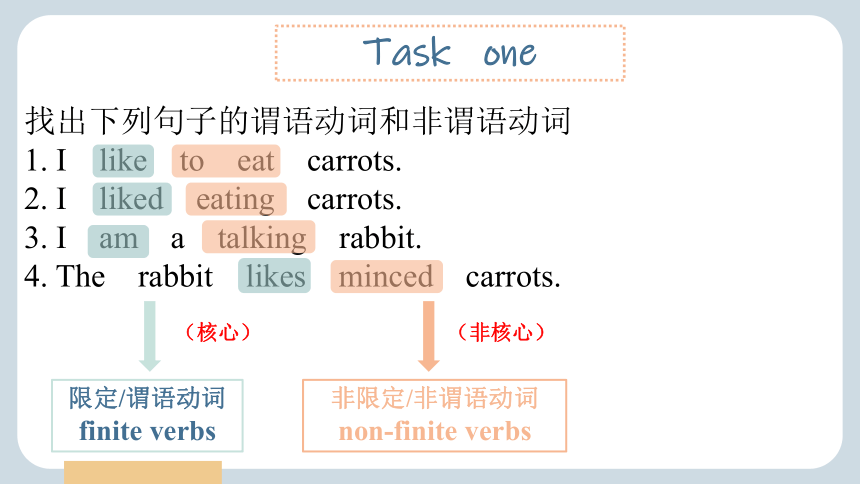
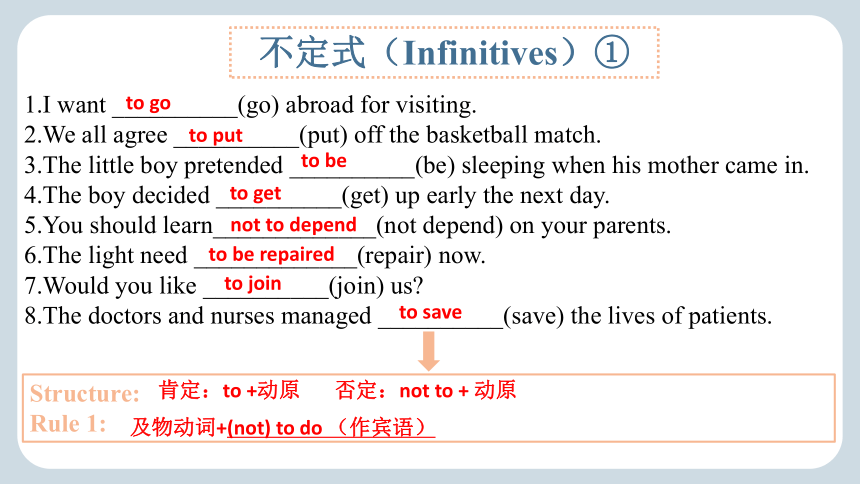
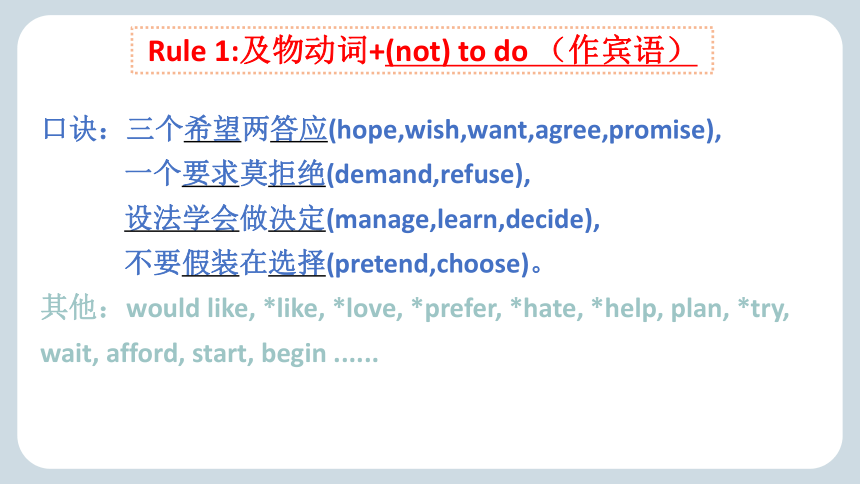
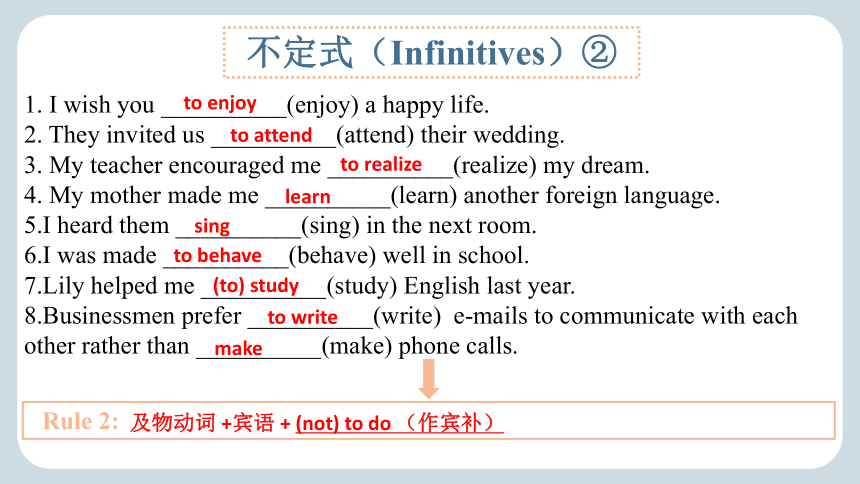
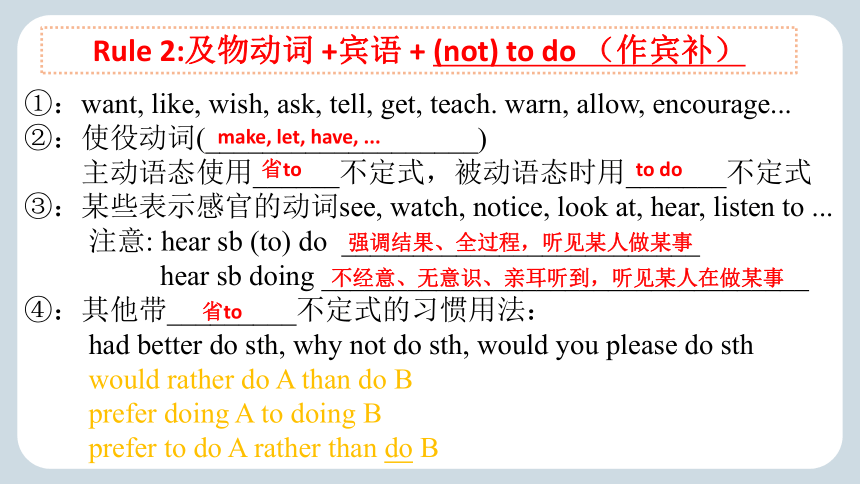
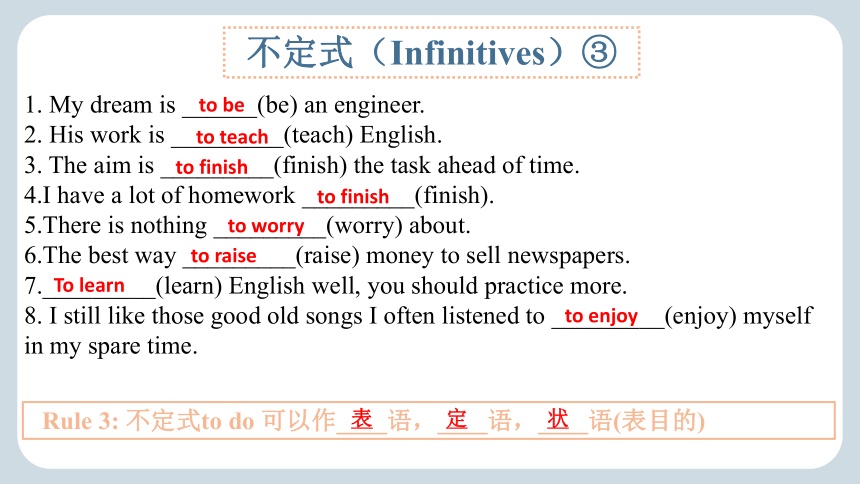
文档简介
(共25张PPT)
教学设计(3课时)
课前:发放预习材料,预习并完成习题
课中(主体部分):不定式(1),动名词(1),评讲(1)
课后:完成思维导图、专题练习、错题整理
Grammar
非谓语动词
1.The differences between finite verbs and non-finite verbs.
谓语动词和非谓语动词的区别
After this lesson, you should know about ...
2.The different forms and usages of non-finite verbs.
非谓语动词的不同形式和用法
3.How to use proper words to fill the blanks in the exam.
语法填空动词实词类做题策略
找出下列句子的谓语动词和非谓语动词
1. I like to eat carrots.
2. I liked eating carrots.
3. I am a talking rabbit.
4. The rabbit likes minced carrots.
Task one
限定/谓语动词
finite verbs
非限定/非谓语动词
non-finite verbs
(核心)
(非核心)
1.I want __________(go) abroad for visiting.
2.We all agree __________(put) off the basketball match.
3.The little boy pretended __________(be) sleeping when his mother came in.
4.The boy decided __________(get) up early the next day.
5.You should learn_____________(not depend) on your parents.
6.The light need _____________(repair) now.
7.Would you like __________(join) us
8.The doctors and nurses managed __________(save) the lives of patients.
不定式(Infinitives)①
Structure:
Rule 1:
to go
to put
to be
to get
not to depend
to be repaired
to join
to save
肯定:to +动原 否定:not to + 动原
及物动词+(not) to do (作宾语)
Rule 1:及物动词+(not) to do (作宾语)
口诀:三个希望两答应(hope,wish,want,agree,promise),
一个要求莫拒绝(demand,refuse),
设法学会做决定(manage,learn,decide),
不要假装在选择(pretend,choose)。
其他:would like, *like, *love, *prefer, *hate, *help, plan, *try, wait, afford, start, begin ......
1. I wish you __________(enjoy) a happy life.
2. They invited us __________(attend) their wedding.
3. My teacher encouraged me __________(realize) my dream.
4. My mother made me __________(learn) another foreign language.
5.I heard them __________(sing) in the next room.
6.I was made __________(behave) well in school.
7.Lily helped me __________(study) English last year.
8.Businessmen prefer __________(write) e-mails to communicate with each other rather than __________(make) phone calls.
不定式(Infinitives)②
Rule 2:
及物动词 +宾语 + (not) to do (作宾补)
to enjoy
to attend
to realize
learn
sing
to behave
(to) study
to write
make
①:want, like, wish, ask, tell, get, teach. warn, allow, encourage...
②:使役动词(___________________)
主动语态使用______不定式,被动语态时用_______不定式
③:某些表示感官的动词see, watch, notice, look at, hear, listen to ...
注意: hear sb (to) do _________________________
hear sb doing __________________________________
④:其他带_________不定式的习惯用法:
had better do sth, why not do sth, would you please do sth
would rather do A than do B
prefer doing A to doing B
prefer to do A rather than do B
Rule 2:及物动词 +宾语 + (not) to do (作宾补)
make, let, have, ...
省to
to do
强调结果、全过程,听见某人做某事
不经意、无意识、亲耳听到,听见某人在做某事
省to
1. My dream is ______(be) an engineer.
2. His work is _________(teach) English.
3. The aim is _________(finish) the task ahead of time.
4.I have a lot of homework _________(finish).
5.There is nothing _________(worry) about.
6.The best way _________(raise) money to sell newspapers.
7._________(learn) English well, you should practice more.
8. I still like those good old songs I often listened to _________(enjoy) myself in my spare time.
不定式(Infinitives)③
Rule 3: 不定式to do 可以作____语,____语,____语(表目的)
表
to be
to teach
to finish
to finish
to worry
to raise
To learn
to enjoy
定
状
to do 作表语:... dream/job/work/task/aim is _______ sth
to do 作定语:...have + n.+_______ (不定式的动词和n.有动宾关系)
there is nothing/something _______
区别: Is there anyone to sing the song
Is there anyone singing the song
to do 作状语:to do=____________=____________
Rule 3: 不定式to do 可以作表语,定语(后置),状语(表目的)
to do
to do
to do
in order to do
so as to do
1. It is difficult for me _________(read) your writing.
2.It’s kind of you _________(invite) me.
3.I find it boring _________(read) the same book several times.
4.It took me two days _________(finish) reading this book.
5.It’s too dangerous _________(travel) alone.
6.The boy is too young _________(go) to school alone.
7.It’s exciting enough _________(travel) alone.
8.Do you know how _________(make) a card.
9.I have no idea when and where _________(meet).
不定式(Infinitives)④
Rule 4:
it做形式主语或形式宾语的句型中,动词+疑问词+to do, too ... to do, ...
to read
to invite
to read
to finish
to travel
to go
to travel
to make
to meet
①:It is/was + adj. +(for sb) + to do sth.
It is/was + adj. + of sb + to do sth.
It takes sb + some time + to do sth.
It costs sb + some money + to do sth.
②:find/think it +adj. + to do sth.
③:too + adj./adv. + to do sth.
④:adj./adv. + enough + to do sth.
⑤:动词 + 疑问词 + to do sth.
Rule 4: 某些句型、结构中
to do
作真正主语
to do
作真正宾语
学会忘记有难处(learn,forget),
想知就别来劝告(wonder,know,advise),
展示讨论教人对(show,discuss,teach),
弄清才决告诉你(find out,decide,tell)
1._________(eat) too much is bad for our health.
2.It’s no use ________(cry) over spilt milk.
3.She enjoys ________(play) the piano.
4.Lily likes ________________(go) shopping.
5.She is fond of ________(play) football, too.
6.His hobby is ________(grow) flowers.=_________________________
7.Seeing is ________(believe).
8.The ________(read) room is a good place.
9.It is ________(drink) water.
动名词(Gerunds)
Structure: _________________________________
Rules: 动名词可以作____语,____语,____语,____语
Eating
crying
playing
going/to go
playing
growing
believing
reading
drinking
肯定:doing 否定:not doing
主
宾
表
定
注意:动名词表示:______________________________________________
不定式表示:_________________________________________
①动名词作主语 VS 不定式作主语:
Selling fake medicine is a serious crime. 【泛指、笼统】
To sell my old car is difficult. 【特定的】
②某些动词后只跟动名词doing作宾语(不用to do):
Rules: 动名词可以作主语,宾语,表语,定语
笼统、泛指的意思;抽象或经常性的动作;已成为过去的动作
一时性的、具体的或特定的动作;现在或将来的动作
完成实践值得忙(finish/complete, practice, be worth, be busy)
考虑建议不禁想(consider, suggest/advise, cannot help, feel like)
习惯继续不放弃(be/get/become used to, keep, give up)
思念介意又欣赏(miss, mind, enjoy)
③某些动词后既可以跟动名词doing作宾语,也可以跟to do作宾语
try doing _____________ try to do _____________
mean doing _____________ mean to do _____________
stop doing _____________ stop to do _____________
forget doing _____________ forget to do _____________
remember doing _____________ remember to do _____________
go on doing _____________ go on to do _____________
④某些带介词的动词短语后接动名词doing作宾语
look forward to _________(read); pay attention to ________(listen)
Lily spent a lot of money (in) _________(study) English.
Rules: 动名词可以作主语,宾语,表语,定语
试着去做
尽力去做
意味着
打算做
停止做
停下(手里的事)去做另一件事情
忘记做过
忘记要做
记得做过
记得要做
继续做(同一件事)
继续做(另一件事)
reading
listening
studying
⑤动名词作表语 VS 不定式作表语:
My hobbies are listening to the music and reading books.
My dream is to be an English teacher.
⑥动名词作定语 VS 现在分词作定语:
He can’t walk without a walking stick.
Is there a swimming pool in your school
China is a developing country.
This is an interesting novel.
Rules: 动名词可以作主语,宾语,表语,定语
动名词=名词
=a stick for walking
=a pool for swimming
现在分词=形容词
①直接加______:
play→_________ ski→_________ work→_________
②以不发音的_____结尾的,去掉______加_______:
have→_________ prove→_________ make→_________ take→_________
③重读闭音节结尾的且末尾只有一个辅音字母的(________结构),双写
_______________加________:
cut→_________ put→_________ swim→_________
stop→_________ run→_________ begin→_________ get→_________
④特殊:
tie→_________ die→_________ lie→_________
动词ing变化规则
ing
playing
skiing
working
having
proving
making
taking
e
e
ing
cutting
putting
swimming
stopping
running
beginning
tying
dying
lying
getting
辅元辅
末尾辅音字母
ing
分词(Participles)①
现在分词(Present Participles)
过去分词(Past Participles)
Structure: _________________________
①作定语:
The shocking news made us unhappy.
The man standing by the window will give us a lecture soon.
Structure: ________________________
①作定语:
Polluted water and air are very harmful.
He is a teacher respected by the students.
现在分词表示_______关系(主动/被动)
_______意义(进行/完成)
过去分词表示_______关系(主动/被动)
_______意义(进行/完成)
单个分词作定语,前置;分词短语作定语,后置
(not) doing
(not) done
分词(Participles)②
现在分词(Present Participles)
过去分词(Past Participles)
②作表语:
This film is _________(interest).
The girl was frightening.
②作表语:
I am ________(interest) in the film.
The girl was frightened.
现在分词表示主动:
interest → interesting
(v.引起...注意) 引起注意的
过去分词表示被动:
interest → interested
(v.引起...注意) 被引起注意的
分词(Participles)③
现在分词(Present Participles)
过去分词(Past Participles)
③作补语:
He had me standing there, for he was too busy.
③作补语:
He had his money stolen on the bus.
分词作补语,要根据宾语和宾补之间的关系来选用现在分词或过去分词
1.When I walked past the park, I saw some old people _______(dance).
2.He wants to have his TV _________(repair).
3.Don’t leave the water ________(run) while you wash your clothes.
4.I didn’t hear anyone _________(say) anything about it.
*分词(Participles)④
现在分词(Present Participles)
过去分词(Past Participles)
④作状语:
The students went out of the classroom, talking and laughing.
④作状语:
Seen from space, the earth looks like a water-covered globe.
talking and laughing 的逻辑主语是the students, 二者之间是主动关系
Seen from space的逻辑主语是the earth,二者之间存在被动关系
1.The famous translator Xu Yuanchong ________(sit) behind the window and staring at the computer screen.
2.He was exploring how ________(spread) Chinese culture abroad by translating Chinese beauty into Western beauty.
3.When he was little, he ________(influence) by his mother who was interested in literature.
4.He __________ (stop) and looked very sadly at the birds without freedom in front of him.
5.I would like __________(buy) all of them.
6.“Here ________(be) the money!” The man passed the money.
7.However, he then was __________(surprise) to find all the birds had flown away.
Task two: Strategies for the exam
_____(v.)
或__v___(非v.)
分析句子,判断主谓
缺谓语,填谓语
(被动,时态,主语)
不缺,填非谓语
(短语搭配,逻辑分析)
Task three: make a summary with a mind map
1.完成思维导图
2.完成专题练习,总结做题技巧,做好错题分析
3.思考并总结:动词的用法
常见动词短语搭配
Homwork
Where there’s a will,
there’s a way!
Thank you!
教学设计(3课时)
课前:发放预习材料,预习并完成习题
课中(主体部分):不定式(1),动名词(1),评讲(1)
课后:完成思维导图、专题练习、错题整理
Grammar
非谓语动词
1.The differences between finite verbs and non-finite verbs.
谓语动词和非谓语动词的区别
After this lesson, you should know about ...
2.The different forms and usages of non-finite verbs.
非谓语动词的不同形式和用法
3.How to use proper words to fill the blanks in the exam.
语法填空动词实词类做题策略
找出下列句子的谓语动词和非谓语动词
1. I like to eat carrots.
2. I liked eating carrots.
3. I am a talking rabbit.
4. The rabbit likes minced carrots.
Task one
限定/谓语动词
finite verbs
非限定/非谓语动词
non-finite verbs
(核心)
(非核心)
1.I want __________(go) abroad for visiting.
2.We all agree __________(put) off the basketball match.
3.The little boy pretended __________(be) sleeping when his mother came in.
4.The boy decided __________(get) up early the next day.
5.You should learn_____________(not depend) on your parents.
6.The light need _____________(repair) now.
7.Would you like __________(join) us
8.The doctors and nurses managed __________(save) the lives of patients.
不定式(Infinitives)①
Structure:
Rule 1:
to go
to put
to be
to get
not to depend
to be repaired
to join
to save
肯定:to +动原 否定:not to + 动原
及物动词+(not) to do (作宾语)
Rule 1:及物动词+(not) to do (作宾语)
口诀:三个希望两答应(hope,wish,want,agree,promise),
一个要求莫拒绝(demand,refuse),
设法学会做决定(manage,learn,decide),
不要假装在选择(pretend,choose)。
其他:would like, *like, *love, *prefer, *hate, *help, plan, *try, wait, afford, start, begin ......
1. I wish you __________(enjoy) a happy life.
2. They invited us __________(attend) their wedding.
3. My teacher encouraged me __________(realize) my dream.
4. My mother made me __________(learn) another foreign language.
5.I heard them __________(sing) in the next room.
6.I was made __________(behave) well in school.
7.Lily helped me __________(study) English last year.
8.Businessmen prefer __________(write) e-mails to communicate with each other rather than __________(make) phone calls.
不定式(Infinitives)②
Rule 2:
及物动词 +宾语 + (not) to do (作宾补)
to enjoy
to attend
to realize
learn
sing
to behave
(to) study
to write
make
①:want, like, wish, ask, tell, get, teach. warn, allow, encourage...
②:使役动词(___________________)
主动语态使用______不定式,被动语态时用_______不定式
③:某些表示感官的动词see, watch, notice, look at, hear, listen to ...
注意: hear sb (to) do _________________________
hear sb doing __________________________________
④:其他带_________不定式的习惯用法:
had better do sth, why not do sth, would you please do sth
would rather do A than do B
prefer doing A to doing B
prefer to do A rather than do B
Rule 2:及物动词 +宾语 + (not) to do (作宾补)
make, let, have, ...
省to
to do
强调结果、全过程,听见某人做某事
不经意、无意识、亲耳听到,听见某人在做某事
省to
1. My dream is ______(be) an engineer.
2. His work is _________(teach) English.
3. The aim is _________(finish) the task ahead of time.
4.I have a lot of homework _________(finish).
5.There is nothing _________(worry) about.
6.The best way _________(raise) money to sell newspapers.
7._________(learn) English well, you should practice more.
8. I still like those good old songs I often listened to _________(enjoy) myself in my spare time.
不定式(Infinitives)③
Rule 3: 不定式to do 可以作____语,____语,____语(表目的)
表
to be
to teach
to finish
to finish
to worry
to raise
To learn
to enjoy
定
状
to do 作表语:... dream/job/work/task/aim is _______ sth
to do 作定语:...have + n.+_______ (不定式的动词和n.有动宾关系)
there is nothing/something _______
区别: Is there anyone to sing the song
Is there anyone singing the song
to do 作状语:to do=____________=____________
Rule 3: 不定式to do 可以作表语,定语(后置),状语(表目的)
to do
to do
to do
in order to do
so as to do
1. It is difficult for me _________(read) your writing.
2.It’s kind of you _________(invite) me.
3.I find it boring _________(read) the same book several times.
4.It took me two days _________(finish) reading this book.
5.It’s too dangerous _________(travel) alone.
6.The boy is too young _________(go) to school alone.
7.It’s exciting enough _________(travel) alone.
8.Do you know how _________(make) a card.
9.I have no idea when and where _________(meet).
不定式(Infinitives)④
Rule 4:
it做形式主语或形式宾语的句型中,动词+疑问词+to do, too ... to do, ...
to read
to invite
to read
to finish
to travel
to go
to travel
to make
to meet
①:It is/was + adj. +(for sb) + to do sth.
It is/was + adj. + of sb + to do sth.
It takes sb + some time + to do sth.
It costs sb + some money + to do sth.
②:find/think it +adj. + to do sth.
③:too + adj./adv. + to do sth.
④:adj./adv. + enough + to do sth.
⑤:动词 + 疑问词 + to do sth.
Rule 4: 某些句型、结构中
to do
作真正主语
to do
作真正宾语
学会忘记有难处(learn,forget),
想知就别来劝告(wonder,know,advise),
展示讨论教人对(show,discuss,teach),
弄清才决告诉你(find out,decide,tell)
1._________(eat) too much is bad for our health.
2.It’s no use ________(cry) over spilt milk.
3.She enjoys ________(play) the piano.
4.Lily likes ________________(go) shopping.
5.She is fond of ________(play) football, too.
6.His hobby is ________(grow) flowers.=_________________________
7.Seeing is ________(believe).
8.The ________(read) room is a good place.
9.It is ________(drink) water.
动名词(Gerunds)
Structure: _________________________________
Rules: 动名词可以作____语,____语,____语,____语
Eating
crying
playing
going/to go
playing
growing
believing
reading
drinking
肯定:doing 否定:not doing
主
宾
表
定
注意:动名词表示:______________________________________________
不定式表示:_________________________________________
①动名词作主语 VS 不定式作主语:
Selling fake medicine is a serious crime. 【泛指、笼统】
To sell my old car is difficult. 【特定的】
②某些动词后只跟动名词doing作宾语(不用to do):
Rules: 动名词可以作主语,宾语,表语,定语
笼统、泛指的意思;抽象或经常性的动作;已成为过去的动作
一时性的、具体的或特定的动作;现在或将来的动作
完成实践值得忙(finish/complete, practice, be worth, be busy)
考虑建议不禁想(consider, suggest/advise, cannot help, feel like)
习惯继续不放弃(be/get/become used to, keep, give up)
思念介意又欣赏(miss, mind, enjoy)
③某些动词后既可以跟动名词doing作宾语,也可以跟to do作宾语
try doing _____________ try to do _____________
mean doing _____________ mean to do _____________
stop doing _____________ stop to do _____________
forget doing _____________ forget to do _____________
remember doing _____________ remember to do _____________
go on doing _____________ go on to do _____________
④某些带介词的动词短语后接动名词doing作宾语
look forward to _________(read); pay attention to ________(listen)
Lily spent a lot of money (in) _________(study) English.
Rules: 动名词可以作主语,宾语,表语,定语
试着去做
尽力去做
意味着
打算做
停止做
停下(手里的事)去做另一件事情
忘记做过
忘记要做
记得做过
记得要做
继续做(同一件事)
继续做(另一件事)
reading
listening
studying
⑤动名词作表语 VS 不定式作表语:
My hobbies are listening to the music and reading books.
My dream is to be an English teacher.
⑥动名词作定语 VS 现在分词作定语:
He can’t walk without a walking stick.
Is there a swimming pool in your school
China is a developing country.
This is an interesting novel.
Rules: 动名词可以作主语,宾语,表语,定语
动名词=名词
=a stick for walking
=a pool for swimming
现在分词=形容词
①直接加______:
play→_________ ski→_________ work→_________
②以不发音的_____结尾的,去掉______加_______:
have→_________ prove→_________ make→_________ take→_________
③重读闭音节结尾的且末尾只有一个辅音字母的(________结构),双写
_______________加________:
cut→_________ put→_________ swim→_________
stop→_________ run→_________ begin→_________ get→_________
④特殊:
tie→_________ die→_________ lie→_________
动词ing变化规则
ing
playing
skiing
working
having
proving
making
taking
e
e
ing
cutting
putting
swimming
stopping
running
beginning
tying
dying
lying
getting
辅元辅
末尾辅音字母
ing
分词(Participles)①
现在分词(Present Participles)
过去分词(Past Participles)
Structure: _________________________
①作定语:
The shocking news made us unhappy.
The man standing by the window will give us a lecture soon.
Structure: ________________________
①作定语:
Polluted water and air are very harmful.
He is a teacher respected by the students.
现在分词表示_______关系(主动/被动)
_______意义(进行/完成)
过去分词表示_______关系(主动/被动)
_______意义(进行/完成)
单个分词作定语,前置;分词短语作定语,后置
(not) doing
(not) done
分词(Participles)②
现在分词(Present Participles)
过去分词(Past Participles)
②作表语:
This film is _________(interest).
The girl was frightening.
②作表语:
I am ________(interest) in the film.
The girl was frightened.
现在分词表示主动:
interest → interesting
(v.引起...注意) 引起注意的
过去分词表示被动:
interest → interested
(v.引起...注意) 被引起注意的
分词(Participles)③
现在分词(Present Participles)
过去分词(Past Participles)
③作补语:
He had me standing there, for he was too busy.
③作补语:
He had his money stolen on the bus.
分词作补语,要根据宾语和宾补之间的关系来选用现在分词或过去分词
1.When I walked past the park, I saw some old people _______(dance).
2.He wants to have his TV _________(repair).
3.Don’t leave the water ________(run) while you wash your clothes.
4.I didn’t hear anyone _________(say) anything about it.
*分词(Participles)④
现在分词(Present Participles)
过去分词(Past Participles)
④作状语:
The students went out of the classroom, talking and laughing.
④作状语:
Seen from space, the earth looks like a water-covered globe.
talking and laughing 的逻辑主语是the students, 二者之间是主动关系
Seen from space的逻辑主语是the earth,二者之间存在被动关系
1.The famous translator Xu Yuanchong ________(sit) behind the window and staring at the computer screen.
2.He was exploring how ________(spread) Chinese culture abroad by translating Chinese beauty into Western beauty.
3.When he was little, he ________(influence) by his mother who was interested in literature.
4.He __________ (stop) and looked very sadly at the birds without freedom in front of him.
5.I would like __________(buy) all of them.
6.“Here ________(be) the money!” The man passed the money.
7.However, he then was __________(surprise) to find all the birds had flown away.
Task two: Strategies for the exam
_____(v.)
或__v___(非v.)
分析句子,判断主谓
缺谓语,填谓语
(被动,时态,主语)
不缺,填非谓语
(短语搭配,逻辑分析)
Task three: make a summary with a mind map
1.完成思维导图
2.完成专题练习,总结做题技巧,做好错题分析
3.思考并总结:动词的用法
常见动词短语搭配
Homwork
Where there’s a will,
there’s a way!
Thank you!
同课章节目录
- 词法
- 名词
- 动词和动词短语
- 动词语态
- 动词时态
- 助动词和情态动词
- 非谓语动词
- 冠词
- 代词
- 数词和量词
- 形容词副词及其比较等级
- 介词和介词短语
- 连词和感叹词
- 构词法
- 相似、相近词比较
- 句法
- 陈述句
- 一般疑问句和否定疑问句
- 特殊疑问句及选择疑问句
- 反意疑问句
- 存在句(There be句型)
- 宾语从句
- 定语从句
- 状语从句
- 主谓一致问题
- 简单句
- 并列句
- 复合句
- 主谓一致
- 主、表语从句
- 名词性从句
- 直接引语和间接引语
- 虚拟语气
- 感叹句
- 强调句
- 倒装句
- 祈使句
- 句子的成分
- 句子的分类
- 题型专区
- 单项选择部分
- 易错题
- 完形填空
- 阅读理解
- 词汇练习
- 听说训练
- 句型转换
- 补全对话
- 短文改错
- 翻译
- 书面表达
- 任务型阅读
- 语法填空
- 其他资料
